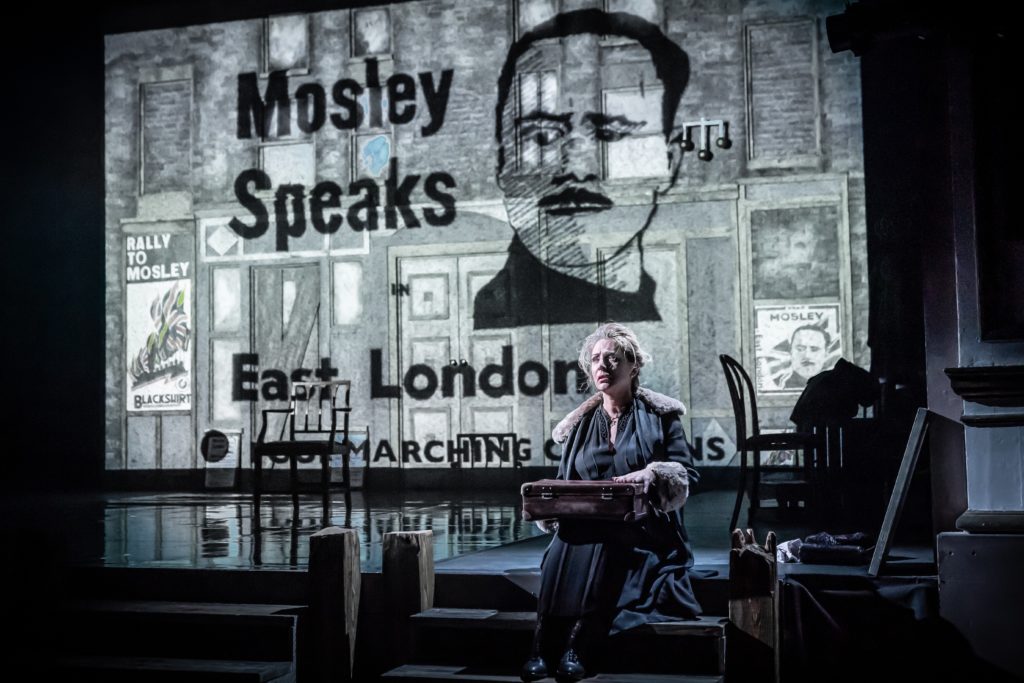
NOTHING will stop The Merchant Of Venice being a problem play, and that’s the problem. Especially against the backdrop of the hell of the Gaza Strip. Suella Braverman’s P45. The English Defence League on the attack. Peaceful Armistice Day protests in London and beyond, demanding a ceasefire, or was that antisemitism?
Amid this tempest, Jewish actress Tracy-Ann Oberman and director Brigid Larmour’s new adaptation of Shakespeare’s vituperative play arrives in York: a city with the darkest stain of history from the Jewish massacre at the site of Clifford’s Tower on March 16 1190, but with a new chapter opened after this autumn’s arrival of Rabbi Dr Elisheva Salamo as the spiritual leader of the York Liberal Jewish Community.
Is The Merchant Of Venice antisemitic, cursed by Shakespeare’s depiction of moneylender Shylock as English literature’s most archetypal Jewish character? “I think its legacy is antisemitic. So yes, I suppose it is an antisemitic play,” Oberman told the Guardian during rehearsals for this Watford Palace Theatre production in February.
Henry Goodman, who won an Olivier Award for his Shylock in Trevor Nunn’s 1999 National Theatre production, said in the same piece: “I think it depicts antisemitism, but is not antisemitic because it humanises.”
Abigail Graham, Jewish director of The Globe’s “radical” 2022 production, defined the play thus: “It’s not a play about antisemitism,” the Guardian quoted her. “It’s about the intersection between white supremacy, capitalism, patriarchy, antisemitism and racism”.
Why this preamble? You could make a case for each assessment, but ultimately the argument over whether The Merchant Of Venice is antisemitic will never be decided by any one production.
Ultimately, Graham has it right in referring to the intersection, one that now defines British or, more to the point, English discomfort at our colonial past and its continuing impact.
Let’s call The Merchant Of Venice an “uncomfortable” play, one where Shakespeare has Portia destroy Shylock in court, for the moneylender to slink away never to be heard again, only for a jocund ending to follow with fun and games over wedding rings as if we had strayed into one of his summer-lit comedies.
Unlike Shylock, Oberman and Larmour are not content to let it end there, instead adding a coda to round off the 1936 setting amid the rising tide of Oswald Mosley’s British Union of Fascist Blackshirts, on the march through Cable Street in London’s East End on October 4 that year.
All Larmour’s cast strip off glad rags and fascist appareil to stand with Oberman’s Shylock, behind her banner They Shall Not Pass “We are stronger, prouder and safer together,” is her message, as she urges all the audience to its feet. (Well, that’s one way to ensure a standing ovation as sems to be becoming increasingly obligatory at theatre shows.)
Not everyone obliged, perhaps uneasy that the problems highlighted by this problematic play are more complicated, more nuanced, than that.
Shakespeare’s play has “always fascinated and repulsed” Oberman. “I don’t like it. I’ve never liked it,” she said. Does anyone “like it”, however? It is not Hamlet, nor King Lear, more questions than answers, but she wanted to “reclaim Shylock”, not to play Shylock for sympathy, nor shy away from the villainy, but to show why Shylock “becomes the monster that they make her” in the face of Jewish persecution.
Traditionally a male role, Oberman has taken inspiration from her great-grandmother’s hardy, dignified East London generation to depict Shylock as a Cable Street pawnbroker and single mother with an errant daughter (Grainne Dromgoole’s Jessica), played as righteous, resolute, rigorous and wronged.
This adds gender and misogyny to the degradation of the spat-upon Shylock at the hands of Raymond Coulthard’s sneering Antonio, dressed all in Mosley black, as he mocks her demand for her pound of flesh on failing to meet the terms of his bond.
Liz Cooke’s design depicts Shylock’s Cable Street home in drab, brutalist grey brick. By contrast, Portia’s film-noir high society elegance is denoted by a marble floor, a white curtain and silk dresses; Antonio’s business world by a chandelier.
Greta Zabulyte’s matching black and white video design begins with Mosley mid-speech, to be followed by fascist posters, newspaper headlines and period footage, all leading up to the Battle of Cable Street. Sarah Weltman’s sound design of smashed windows and loud, threatening voices and Erran Baron Cohen’s piano compositions shadow what is unfolding with haunting inevitability. The Star of David is highlighted on the wall, but Jew Dog is scrawled on Shylock’s door.
As mentioned earlier, one problem in The Merchant Of Venice is the contrasting tones: the chortling comedy of Portia’s hapless suitors seeking to win her hand, topped off by Gavin Fowler’s outwardly charming Bossanio, as if in a Noel Coward or Oscar Wilde comedy of manners, but the visceral, shocking hatred of Shylock, as exemplified by the thuggish excesses of Xavier Starr’s Gratiano. You can but choke on the comedy.
The transition of York-born Hannah Morrish’s Portia – my other character is a Portia too – typifies this dichotomy. Aloof but irresistibly attractive society belle, all-hours socialite, scheming aristocrat, as if she were the seventh Mitford sister, but then she becomes, as Oberman has indelicately put it, an effing bitch in her chilling courtroom humbling of Shylock.
This is a high-quality production, from design to vocal delivery, if fast-moving rather than moving, with well edited dialogue and a modernity to its theatricality and tone.
Does Obeman “reclaim Shylock” in what she calls her legacy heritage project? The play, the central character, Shakespeare’s motives, will still divide opinion, and new horrors will always inform them, but what Oberman and Larmour highlight is how unlikeable everyone is in The Merchant Of Venice. Until that unifying coda, but when will such a coda head over the horizon? Not any time soon.
Watford Palace Theatre in The Merchant Of Venice 1936, York Theatre Royal, until Saturday, 7.30pm nightly plus Box office: 01904 623568 or yorktheatreroyal.co.uk.
